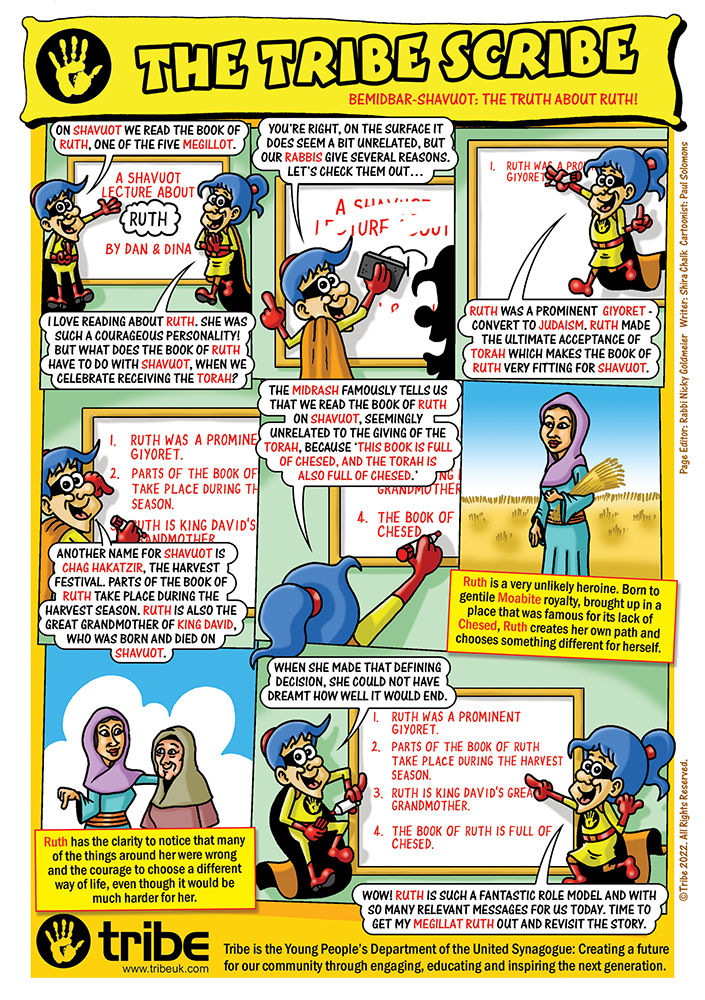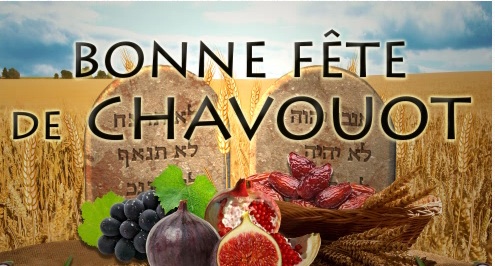Hi Bonjour / Hello [nickname_else_first_name]
Shavuot ( listen (help·info)), or Shavuos (
listen (help·info)), or Shavuos ( listen (help·info)) in some Ashkenazi usage (Hebrew: שָׁבוּעוֹת, Šāvūʿōṯ, lit. "Weeks"), commonly known in English as the Feast of Weeks, is a Jewish holiday that occurs on the sixth day of the Hebrew month of Sivan (it may fall between May 15 and June 14 on the Gregorian calendar). In the Bible, Shavuot marked the wheat harvest in the Land of Israel (Exodus 34:22). In addition, Orthodox rabbinic traditions teach that the date also marks the revelation of the Torah to Moses and the Israelites at Mount Sinai, which, according to the tradition of Orthodox Judaism, occurred at this date in 1314 BCE.[2]
listen (help·info)) in some Ashkenazi usage (Hebrew: שָׁבוּעוֹת, Šāvūʿōṯ, lit. "Weeks"), commonly known in English as the Feast of Weeks, is a Jewish holiday that occurs on the sixth day of the Hebrew month of Sivan (it may fall between May 15 and June 14 on the Gregorian calendar). In the Bible, Shavuot marked the wheat harvest in the Land of Israel (Exodus 34:22). In addition, Orthodox rabbinic traditions teach that the date also marks the revelation of the Torah to Moses and the Israelites at Mount Sinai, which, according to the tradition of Orthodox Judaism, occurred at this date in 1314 BCE.[2]
The word Shavuot means "weeks", and it marks the conclusion of the Counting of the Omer. Its date is directly linked to that of Passover; the Torah mandates the seven-week Counting of the Omer, beginning on the second day of Passover, to be immediately followed by Shavuot. This counting of days and weeks is understood to express anticipation and desire for the giving of the Torah. On Passover, the people of Israel were freed from their enslavement to Pharaoh; on Shavuot, they were given the Torah and became a nation committed to serving God.[3]
- Wikipedia
Traditionally our community eats dairy only during the holiday of Shavouot
Table of contents
1) Perashat Hashavoua & Shavuot - Rabbi Eli Mansour
2) Halakhat Hashavoua - Hazzan David Azerad
3) Holy Jokes!
4) FOR KIDS!

1)PERASHAT HASHAVOUA
This Week's Parasha Insight with Rabbi Eli Mansour
Shavuot- The Challenge – and Rewards – of Torah Commitment
Tradition teaches that the souls of all Jews who would ever live until the end of time were present at Mount Sinai when the Torah was given. This concept actually finds halachic expression, in the concept of "Mushba Ve’omed Me’Har Sinai," which means that we are all considered to have vowed at Mount Sinai to observe the Torah. The Rabbis teach that a vow to observe the Torah does not add anything, since we in any event are bound by the oath we took at Sinai to fulfill all of G-d’s commands.
On the other hand, the Gemara in Masechet Nidda tells of an additional vow that we all took, committing ourselves to observe the Torah. The Gemara teaches that before a child is born, the infant is forced to take an oath pledging to be righteous and avoid sin throughout his or her life. A number of Rabbis raised the question of why this oath is necessary, given that the child’s soul had already taken this vow at Mount Sinai. If, indeed, we are all under the category of "Mushba Ve’omed Me’Har Sinai," then why is a second oath necessary before birth?
One answer that has been given is based on a Halacha relevant to employment. An employer is not permitted to change the terms of the agreement with the employee, making his work responsibilities more difficult, without the employee’s consent. For example, if the arrangement described in the contract involves work to be done in a comfortable, air-conditioned building, the employer is not entitled to change his mind and force the employee to work outside in the scorching heat.
When we vowed at Sinai to fulfill the Misvot, we made this vow when we were just souls, without a body. But when an infant is born, the soul is placed into a body. Needless to say, observing the Torah is infinitely more difficult with a physical body. It is because of our bodies that we have needs that distract us from our obligations to G-d, and that we are so easily tempted and lured toward sinful conduct. The oath we made as souls at the time of Matan Torah does not require us to observe the Torah under the far more difficult circumstances of life with a human body. Therefore, just before birth, when the soul enters the infant’s body, a new oath is needed, wherein the child promises to meet the great challenge of fulfilling the Misvot with a physical body.
As we prepare for Shabuot, when we reaffirm our acceptance of the Torah, we should remind ourselves that Torah observance is worth every bit of hard work and sacrifice that it entails. As any conscientious Torah-committed Jew knows, living a spiritual life in our physical world is very challenging, and is fraught with struggles. But we firmly believe that the benefits and rewards of our religious commitment are worth far more than anything that we are required to sacrifice for Torah observance. We accept the Torah fully aware of the difficulty involved – but also fully aware of the great benefits we receive by striving and working to serve our Creator to the best of our ability.
Youtube Video: Rabbi Mansour preparing for Shavuot

2) HALAKHAT HASHAVOUA
Selected & translated by David Azerad, Hazzan Maghen Abraham
BONUS HALACHA
Shavuot Laws according to the rulings of Maran Rabbi Obadiah Yosef ZT’’L
What is Eruv Tavshilin?
When Yom Tov falls close to Shabbat, the sages forbade preparing or cooking on Yom Tov for Shabbat, because it is seen as belittling or disrespecting the sanctity of Yom Tov. That is why the Sages instructed to do Eruv Tavshilin, which shows that one started his preparations for Shabbat before Yom Tov, and when one cooks on Yom Tov, he only completes and finishes his preparations. By doing this, one will be allowed to cook from Yom Tov to Shabbat. Therefore, when The holiday is on Friday, and one wants to cook on a Yom Tov in honor of Shabbat, one will put together a dish consisting of for example a hard-boiled egg with Challah or a piece of cooked fish, chicken or meat. Usually two of these items are sufficient for Eruv Tavshilin.
Who is exempted from Eruv Tavshilin
Since the main purpose of Eruv Tavshilin is so that we can bake and cook on Yom Tov for Shabbat, therefore those who cooked all of Shabbat's dishes before Yom Tov, and only put them on the Hot plate on Yom Tov so that they warm up for Shabbat, do not need to make Eruv Tavshilin for lighting candles that are lit in honor of Shabbat, and if one wants to do Eruv Tavshilin, let him say it without a blessing.The Eruv is done on Thursday afternoon before the Chag and it should be eaten on Shabbat perferabely during seuda Shelisheet.
Bevirkat chag Sameach & Shabbat Shalom
David Azerad
The laws of Shavuot, according to the rulings of Rabbi Obadiah Yosef Z”TL
When Shavuot falls on a Saturday night - how should we proceed?
One should light on Friday night before lighting the Shabbat candles, a large candle that can last for at least 48 hours , so that there is a lit fire ready for Saturday night to light the candles for Chag Shavuot ,as we can only light from an existing fire. One should be careful to light the candles only after the Shabbat is over.
Since the time is limited to cook on Motzei Shabbat, it is therefore appropriate to cook all the meals of the Chag on Friday and leave them in the fridge or freeze them, and at the end of Shabbat you can heat the food in the oven or stovetop that was lit before Shabbat or if it is a gas oven one may light it from an existing flame
How to prepare from Shabbat to Yom Tov?
It is permissible to take out the prepared frozen meals out of the freezer to thaw them for the holiday meal. However one may not start any other preparations, such as lighting a fire and cooking until Motzei Shabbat.
It is permissible to rest on Shabbat in order to be awake and have strength on Motzei Shabbat for the Limud / Tikkun Leil Shavuot or keraya ,just not to say that you are sleeping in order to stay awake for the night as it is considered preparing from Shabbat to Yom Tov.The custom on the night of Shavuot is to stay awake all night or at least part of the night to study Torah.The Sephardim have the custom to read in the book Keri-ai Moed that has in it the entire Seder for the night.
What should one be doing on Shavuot?
One should try to engage in the study of Torah throughout the Chag.As much as it is important to have festive meals and rest it is equally important to study Torah as it is written “חציו לה' וחציו לכם” which means half of the time of the holiday is dedicated for Hashem (prayers and Torah study) and the other half of the day is dedicated for us having a festive meal and resting.
The custom of the Sephardim is to read on both days Megillat Ruth, one part the first day and the second part the next day. It is also the custom to read the Azharot also on both days Mitzvot Ase and Mitzvot Lo Ta’ase founded by Rabbi Iben Gvirol, As well as to study the Rambam Mitzvot Ase and Mitzvot Lo Ta’ase all found in the book Keri-ai Moed.
King David was born and died on Shavuot, so it is customary to read the Book of Psalms on Shavuot as well.
Bevirkat Shabbat Shalom Umevorach
Chag Shavuot Sameach
David Azerad
3) HOLY JoKeS!!
Selection of funny snippets, loosely related to this weeks parashah, to brighten your day
Q. What kind of man was Boaz before he married?
A. Ruth-less.
Q. Which servant of G-d was the most flagrant lawbreaker in the Bible?
A. Moses. He broke all 10 commandments at once.
Q. Did you know it’s wrong for a woman to make coffee? Yup, it’s in the Bible. It says . . .
A. “He-brews”
Q: Where is medicine first mentioned in the Bible?
A: When God gave Moses two tablets.
Q: What do you call cheese that is sad?
A: Blue cheese.
Q. Which hotel serves the best cheese?
A: The Stilton
Q: Why does cheese look sane?
A: Because everything else on the plate is crackers.
Q. What does a cheese say on Shavuot?
A: Have E-dam good day!
Q. What type of cheese is made backwards?
A. EDAM.
Q. After Shavuot we all need to go on diet. Why?
A. To cheddar a few pounds.


FOR KIDS!
|
Click on the image to open the youtube video


|
|
|














